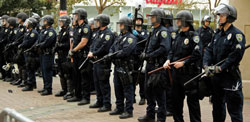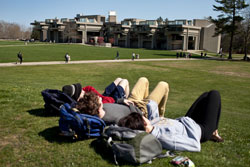Local coffee shops can’t compete with the big chains on visibility, marketing and brand-name recognition. But what really counts, they say, is what’s in the cup, and that’s where they think they can hold their own.
North Jersey coffee shop owners are spending more time- and money- focusing on getting better coffee beans, and sometimes roasting their own. And they’re also reaching out into their communities, building relationships, name recognition and their own brand of loyalty with their best customers.
It isn’t easy, in a saturated market where the big name retailers like Starbucks, with 47 stores in Bergen and Passaic counties, and Dunkin’ Donuts, with 50, seem to be on every corner. They’re competing for an ever-increasing number of people seeking their daily caffeine fix. The National Coffee Association’s latest survey last Sept. showed that 83 percent of adults in the United States drank coffee in one form or another, up five percent from 2012, and one third of consumers drink a “gourmet” coffee each day, or something other than your average blend.
That’s not news to Terry Jung, co-owner of Ridgewood Coffee Co.
“We are in the third generation of coffee consumption,” said Jung, who purchased the Ridgewood, NJ, shop in Dec. “Coffee started with the daily, instant-style dollar-fifty kind of coffee. Then it moved to the Starbucks-style, which educated customers to pay more. Now we are where customers know and understand coffee, and are willing to pay more. But we want to be more than that; we want them to taste and see why.”
Soon after buying the business, Jung upgraded the quality of its coffee beans, to put his coffee a “step above” the coffee joints he was familiar with. The shop now serves Chicago-based Intelligentsia brand coffee and espresso, which was rated the 10th-best coffee roaster by USA Today. Jung pays $25 to $30 per pound of coffee, up about five percent from what the previous owner was paying. He said the coffee beans account for 25 percent of the store’s expenses each month.
In turn, the price of an individual cup of coffee might be more expensive than a chain store, but Jung believes since customers are more educated about coffee than previous generations were, they are willing to spend more for a higher-quality cup of java.
“My model is to have the best product out there,” Jung said. “It’s a little expensive. However, anything we carry I want to be the best.”
Eileen Cassano, who owns The Angry Coffee Bean in North Arlington, NJ, with her husband, Michael, is staying local and cutting distribution costs by buying all her beans from Red House Roasters in Union City, NJ, whose owner used to work with her at her previous job at a cable television company.
“I swear people think I make this up, but they do such small batches that the beans are still warm in the bag when (the company) delivers them,” Cassano said.
John Vitale, the master roaster and executive chef of Sogno Coffeehouse in Westwood, NJ, has been roasting his beans on-site rather than buying already roasted beans since the business opened in 2012. Sogno uses Royal Coffee New York Inc., an Edison, NJ-based distributor that ships beans from Central America, Africa, Indonesia and South America.
Besides cutting out the middle man to save on expenses, Vitale said bringing the roasting process in-house leads to fresher-tasting, more robust drinks.
“The challenge of oversaturation is there,” Vitale said, “so the key for us is how we combat that- our model is doing it in-house. When the product is a little above the rest, people notice that and will pay for that.”
In addition to the higher quality coffee, shop owners said being a recognized part of the community is paramount to their business’ success.
Cassano said The Angry Coffee Bean has hosted a dog rescue benefit, health seminars, open-mike nights, events that donate to local schools and in the spring will begin hosting art classes. Cassano said she has even gone door-to-door in neighboring towns to introduce her store to other businesses in the area.
“It’s all about getting your foot in the door in the community,” Cassano said. “Small businesses need to think outside the box these days to bring people in.”
Vitale said Sogno Coffeehouse has worked with the Westwood Chamber of Commerce to set up a college scholarship for students in need of financial aid and sponsored a girls softball team.
Jung said in addition to their weekly open-mike nights, Ridgewood Coffee hopes to begin hosting “cupping” demonstrations, where a barista would showcase the entire brewing process, to further educate consumers about the coffee they are consuming.
“Word of mouth has been our biggest marketing,” Vitale said. “I think a mistake a lot of business make is not capturing the local audience. We have become part of the community, and that’s helped our business.”


